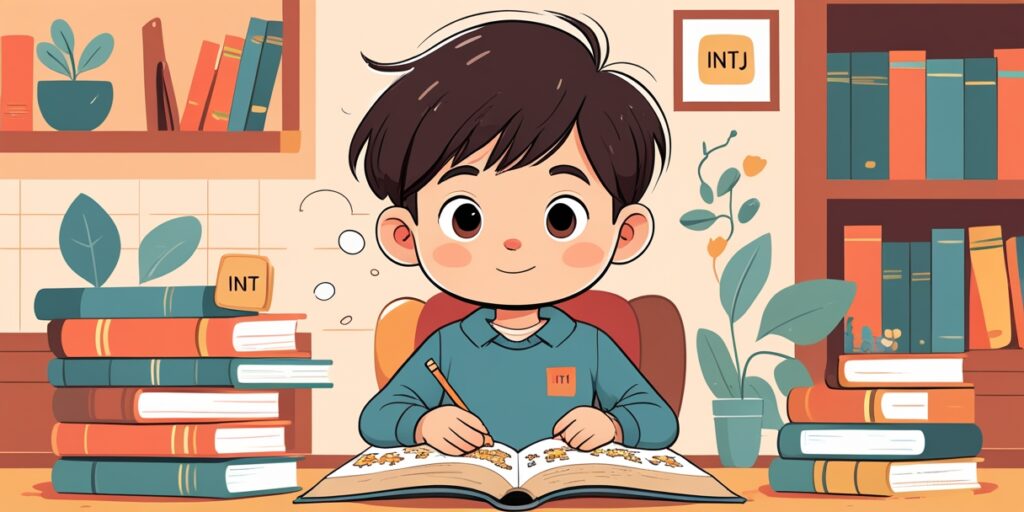
Introduction 🌱
INTJ parenting insights can be incredibly valuable for families. Raising an INTJ child is both exciting and challenging. Known for their independence, sharp focus, and big-picture thinking, INTJs often seem like little adults even at a young age. This post explores how to understand your INTJ child’s personality, how to support their growth, and what parents can do to build a strong and trusting relationship.
Recognizing the INTJ Child 🧩
INTJ children are often curious, observant, and strategic. They like solving puzzles, analyzing systems, and imagining long-term possibilities. While other kids may enjoy spontaneous play, INTJs prefer structured activities or projects where they can feel a sense of mastery. These early traits reveal the INTJ personality type’s natural tendency to plan, organize, and think ahead.
Parents may notice that their child asks deep or unexpected questions, showing a strong inner world. They may also demonstrate a surprising maturity, preferring meaningful conversations over small talk. This independent mindset can be rewarding, but also makes parenting an INTJ child a unique journey.
Learning Style and Curiosity 📚
An INTJ child thrives in environments that challenge their intellect. They love exploring new topics and often dive deep into subjects that fascinate them. For example, while other kids may casually enjoy dinosaurs, an INTJ child might memorize entire evolutionary timelines or design a system to categorize species.
Supporting this curiosity means giving them access to books, tools, or even mentors who can match their enthusiasm. Encouraging their INTJ traits doesn’t just build knowledge—it also boosts their confidence in being different. Parents who provide intellectual stimulation often see their INTJ children flourish in school, hobbies, and even early career interests.
Parenting Challenges ⚖️
Because INTJs are highly independent, they may resist authority or rules that feel arbitrary. Parents may hear, “Why should I do it this way?” or “That doesn’t make sense.” This can create friction at home if parents expect unquestioning obedience.
To handle this, parents need to explain the reasoning behind rules and invite their child into the problem-solving process. By showing respect for their logic, parents can turn potential conflicts into learning opportunities. This is one of the most important aspects of raising an INTJ child.
Another challenge is their tendency toward perfectionism. INTJs hold themselves to very high standards, and when they fall short, they may become frustrated or overly self-critical. Parents should be mindful of this, offering reassurance that mistakes are part of growth. Helping them see progress instead of perfection makes a big difference.
Encouraging Emotional Balance 💖
While INTJs are intellectually strong, they may struggle with emotional expression. Parents should encourage healthy ways of sharing feelings—through journaling, art, or calm conversation. Remind them that vulnerability is not weakness but a part of growth.
Building trust is essential: when INTJ children feel misunderstood, they may withdraw. But when they know their parents respect both their mind and emotions, they are more likely to open up.
It’s also helpful to model emotional intelligence as a parent. Showing them how to manage stress, resolve conflicts, and express empathy gives INTJ children a framework to follow. Over time, they learn that balancing thought with feeling creates stronger connections.
Practical Parenting Tips ✅
- Respect independence. Allow your child space to explore ideas and projects.
- Explain the “why.” Logical reasoning earns more cooperation than authority alone.
- Encourage friendships. Help them connect with peers who share interests, while also practicing social skills with different personality types.
- Balance intellect and emotions. Remind them it’s okay to feel, not just think.
- Celebrate progress. Recognize their achievements, big or small, and praise their effort rather than only results.
- Provide challenges. Give them opportunities to solve problems or take on leadership roles, which can build resilience and confidence.
Final Thoughts 🌟
Parenting an INTJ child can be a remarkable experience. These children bring vision, determination, and curiosity into the world. With patience and respect, parents can nurture their strengths while guiding them through challenges. By understanding INTJ parenting insights, families can create a supportive environment that empowers these rare thinkers to thrive.
The key is balance: providing enough freedom for their independent mind, while also guiding them to connect emotionally with others. When parents achieve this balance, INTJ children not only succeed academically and creatively but also grow into compassionate, confident adults.